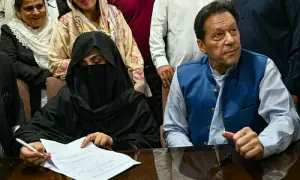Indian students protest against Oxford Union’s debate on ‘independent Kashmir’
3 min readSeveral Indian students have staged a protest against the Oxford Union for organising a debate on the topic of “independent Kashmir,” a contentious issue that has long been a source of conflict between India and Pakistan.
Experts and historians have noted that the behaviour of the protesters reflects the ideology of Hindutva, influenced by the narrative promoted by the Indian Prime Minister Narendra Modi government. There is a prevailing sense of nationalism and unrealistic pride within the Indian state, which has led to irrational behaviours on the global stage. Often, such protests are based on misinformation and distorted facts, raising concerns about the broader implications for discourse surrounding sensitive issues like Kashmir.
The Kashmir issue, a remnant of British colonial governance, has been a source of tension in the subcontinent since 1947, leading to several wars and ongoing disputes. The persistent call for Kashmiri freedom is part of a long-standing local struggle based on demands for self-determination and political autonomy in the region.
India’s constitution guarantees a secular framework that prohibits the intertwining of state and religion. But contemporary India appears to be straying from the secular ideal, as Hindutva ideology has deeply permeated state institutions and social structures.
Organisations like the Rashtriya Swayamsevak Sangh (RSS) and the Bharatiya Janata Party (BJP) are pursuing an unwavering agenda aimed at transforming India into a Hindu state, where Hindus hold supremacy and non-Hindus face marginalization. This ideology is clearly influencing the political and social landscape of India, raising concerns about the future of secularism and pluralism in the country.
India has emerged as one of the countries with the most significant human rights violations, where the rights of minorities are systematically trampled upon, both in Kashmir and on the Indian mainland. Often, these violations occur with the direct approval or support of the Indian state.
The necessity for a new social contract in India has become evident, as the facade of secularism has revealed deep fissures that undermine the credibility and legal standing of the current political and social system.
It is crucial to highlight and appropriately respond to the unacceptable behavior of Indian students, particularly in light of rising trends within certain segments of the Indian diaspora that often undermine the principles and values of Western societies.
The recent protest by Indian students at the Oxford Union—an unprecedented event in the institution’s history—calls for stringent disciplinary measures against such behavior, which is seen as a deliberate attempt to damage the reputation of one of the world’s most prestigious educational establishments.
The protests by Indian students at the Oxford Union promote a culture that directly contradicts the principles of free expression and constructive dialogue to resolve issues. Their response to an academic event has raised alarm bells, prompting questions about what positive role India can play with such limited thinking.
The debate on the Kashmir issue at the Oxford Union has challenged India’s unfounded claims and highlighted the growing awareness and interest of the international community regarding the Kashmir conflict.
It is also noteworthy that the international community does not view the Kashmir issue solely from India’s perspective. India must come to terms with reality and recognise historical facts to foster a more informed and constructive global dialogue.
For the latest news, follow us on Twitter @Aaj_Urdu. We are also on Facebook, Instagram and YouTube.






















Comments are closed on this story.